- Home
- Gregory Ashe
The Mortal Sleep (Hollow Folk Book 4) Page 12
The Mortal Sleep (Hollow Folk Book 4) Read online
Page 12
“Why? So I can—” I had to bite the inside of my mouth, and I tasted blood. “So I can be buddies with my dad? So we can play catch? So he can take me fishing and buy me an ice cream and have a serious talk with me about girls and then, at the end, give me a rubber to keep in my wallet? Jesus Christ. Have you met that man?”
“He’s making a lot of progress, Vie. He knows he’s made mistakes. He’s getting treatment for his addictions, and he’s attending counseling, and I think you’d be really proud—”
“Get out.” I stood, and my socks slipped on the wood, and I had to catch myself on the bed. I shot a finger toward the door. “Get the fuck out of my room.”
“Your behavior at school is a sign that things aren’t working out, no matter how hard Ms. Miller tries—”
“Get out!”
She was tall. Taller than me. And built like a brick wall. But damn if that woman didn’t scurry out of the room. I slammed the door shut behind her.
Anger sat on my chest, making my breaths difficult. I paced the length of the room. Every other step, my socks would slide, and I’d have to catch myself, and I’d get angrier. One. Two. Slip. Dad. They were going to send me back to Dad. One. Two. Slide. Dad. They were going to send me back to Dad.
I dropped onto the bed and ripped off the socks. My feet were sweaty. I was sweaty all over, in fact, but my feet were so goddamn sweaty that I couldn’t get the socks off, and I just kept ripping at them, pulling as hard as I could, until the seams gave on one and tore with long, stuttering pops.
“Fuck,” I screamed. Downstairs, the muffled conversation between Ginny and Sara halted.
And it was so stupid and so ridiculous that it actually made me feel better.
I flopped backward on the bed. My heart was racing, but the practical side of my mind began to take over. Ok. They were planning on getting rid of me. Sending me back to Dad. Well, I wasn’t going to live with that piece of shit again. I wasn’t going to let him hit me again. I wasn’t going to let him blow my cash on crystal again. I wasn’t going to be afraid to go home ever again.
A part of me, though, was still a kid. A part of me still had hope. It was a stupid, tiny part of me that I couldn’t crush no matter how hard I tried. That part of me remembered the good times—the few good times—with Dad. Like the day he’d taken me to Lake Thunderbird, and it had been late autumn, with giant red maple leaves bobbing on the water like flakes of fire, but it had been warm, too. And I remembered how he had helped me cup my hand around a flat gray stone. And how he had held my arm just right, shown me how to throw, and the whick of the stone in the air, and the wet smack as it kissed the water once, twice, and then flopped down into the depths.
No. I wasn’t going back, no matter what.
Opening my inner eye came easier to me now. It overlaid the world with texture, as though I were seeing everything through a microscope, the warp and weft of molecules staining everything like the grain in wood. Color changed too; some colors grew deeper or brighter. The world seemed hyper-saturated; the colors lay over everything in a scrim, visible and not visible at the same time. It was enough to give me a blinding headache.
Over the last few months, as I had explored this ability, I had started to learn some of what it meant. Some of the colors had to do with emotion—excess emotion, strong emotion. My whole bedroom was stained in various shades of red, and the psychic echoes of lust and love made me dizzy. A lot of that was Austin; the damn bed squeaked so loud that we had to wait until Sara was gone, but we’d still found plenty of opportunities. I didn’t even want to know what the shower looked like. But some of the red in here, the parts that looked like flame, some of that was Emmett. And there were tinges of blue and black now. Like a bruise. Like thick ice on dark water. Like the heart of winter. Some of that was what he was still carrying around for Makayla, for himself, Christ, for what had been done to him. I’d turned the spigot and let all of that come rushing out, and I’d damn near killed him doing it.
The next part still didn’t come easily. I pushed. It was like sitting up, like doing a sit-up or a crunch, but with a different set of muscles. I separated, peeling out of my physical body, projecting myself into the other side. And then, once it was done, it was like—well, a bit like being in a dream. I had a body, and I moved through the world. But at the same time, my real body was lying on the bed, my eyes almost closed, my breathing slow. I could travel more easily like this. I focused on the living room below, and just like that, I was there.
It was empty. The phone, on the table next to the sofa, had the receiver off the cradle, and I circled around. Sara had pulled out the cord and let it fall to the floor. It looked like she wasn’t in the mood to take any calls. Ginny’s bag sat next to the chair that Shay had peeled the gimp from. From the kitchen came voices. Sara’s was rough and low. Ginny’s was pure bullshit: an emotionless sympathy that sounded like it had been drilled into her by a corporate training video. I drifted to the kitchen and risked a quick look.
Ginny’s ability placed her on both sides—the real world and the other side. And I knew I was taking a risk of being seen. In fact, that was kind of the whole point. I actually thought that might work to my advantage. If Ginny noticed me, I hoped she would assume that it meant I was doing typical teenage things: lying in bed, sulking, and trying to eavesdrop. I needed her to think that was all I was doing.
When I looked into the kitchen, I saw Sara at the sink, running hot water over two sudsy mugs. I guess they had finished coffee or tea or whatever Sara had served. Her back was to me, and her frizz of blond hair glowed in the weak afternoon stormlight. Sara paused as I watched, the sponge stuffed inside one of the mugs, and her shoulders heaved once.
Ginny, at the table, folded and unfolded her hands like a schoolgirl reciting. She sat at an angle, and the kitchen door was in her field of vision. But she didn’t even blink when my projected self slipped into the room. She just kept talking to Sara.
“—it’s not anything you can really help with, of course, but you understand that we have to take these kinds of things, this kind of behavior, seriously, especially in the case of a boy with a history of deviant—”
The shatter of ceramic made me freeze, and Sara turned around so fast that I thought, for one heart-stopping moment, that she had somehow sensed my presence. Instead, though, Sara took a single step toward Ginny and raised one hand. Suds dripped off it and spattered the floor. Framed by the weak gray light that came through the clouds, her face lost in shadow, she looked ancient and terrible and domestic all at the same time, like some sort of forgotten goddess.
“You won’t ever say something like that again about Vie. Not in my house. Do you understand me?”
Ginny made a gasping, fishy-faced struggle for words.
I was too distracted by something else to enjoy the moment fully. Where was Ginny’s coyote? When I had met Ginny, I had tried to get a psychic sense of her. Instead, I had run flat into a wall of her own power, and with my inner sight, I had glimpsed a ghostlike coyote that accompanied her. But here I was, a few months later, and the coyote was gone. What did that mean?
Maybe nothing. Maybe something. I wasn’t exactly the expert on psychic-ghost-coyotes. Maybe she was just having an off day. Maybe it was something else; a few months ago, she’d had a bad skiing accident, and that might have affected her abilities. Maybe she’d lost her powers somehow. Maybe that was why she wouldn’t help me. Of course, if that were true, why wouldn’t she just tell me?
I lingered for another moment, waiting for something—for Ginny’s eyes to flick in my direction, for her expression to betray annoyance at my presence, for anything that might tell me that she had noticed me. I got nothing. After Sara’s rebuke, there was an awkward silence, and then Ginny gulped and started listing reasons they were going to put me with Dad again.
Letting my astral projection fade, I opened my physical eyes and sat up. I swung my feet off the bed, stood, and winced when the bo
ards creaked. For this next part, I needed to be very quiet. My torn sock flapped on one foot. The other sock, thank God, was still whole. I crept toward the door.
One problem, though, was that I was over six feet tall, over two hundred pounds, and physiologically not built for sneaking. The other problem was the house. It was old. Not like, thirty or forty years old. Like, pre-electricity old. Like, they’d cut the timbers up in the Bighorns and hauled them down with teams of oxen. And although they’d built the house well and built it to last, and although Sara had done a good job of keeping it up, it was still old, and nothing could fix old.
So it creaked. Everything. Everywhere. Every step I took, something else seemed to creak. The floor. The door. The stairs. From the kitchen, Sara’s voice came clearer and angrier.
“I don’t care if you have the Pope on record saying he thinks it’s a good idea, I’m telling you I know that boy, and the first thing he’s going to do is go to pieces. The minute you tell him—”
“It’s not exactly that simple, Ms. Miller. I want you to look at this. This is a sample of what I’ll give Mr. Eliot, and he knows that things aren’t going to be swept under the rug. Look here, for example, about the regular visits.”
Ginny kept talking, and from time to time Sara grumbled. The chairs squeaked on the kitchen floor, and I imagined Sara’s body language: arms folded across her chest, chin thrust out, her face redder and redder by the minute. There was something about Sara that always made me think of a wild animal that would charge in to defend its young. For the last few months, I’d deceived myself into believing Sara could hold off anything bad—anything from the ordinary world, at least. I hadn’t counted on Ginny being one of those things.
I reached the main floor. My ripped sock flapped away, exposing one sweaty foot. And a sweaty foot, in this case, was a sticky foot. I could hear my skin peel away from the floorboards. Jesus, why hadn’t I taken a page out of the Hulk’s book and ripped my shirt instead?
Step. Then the soft snick of my sticky, sweaty foot peeling away. Step. Snick. Step. Snick. The voices in the kitchen continued. Ahead of me, less than five yards away, was Ginny’s bag. I felt a pang of guilt, but it was like an echo, not the real thing. If anybody asked Sara, she would have sworn herself blue that I wasn’t a thief. But here I was, about to prove her wrong. And she was wrong about me in a lot of ways, I decided. She was wrong if she thought I was going to fall to pieces. She was wrong if she thought I needed her. She was wrong if she thought I couldn’t take care of myself. Because I could. I could take care of myself without any help from anybody. I’d done it for a long time; I’d just gotten out of the habit for a few lousy months.
The rug swallowed the noise of my steps, and I crossed the rest of the distance in a flash. Squatting next to Ginny’s bag, I pulled the mouth wide and peered inside. A travel pack of tissues. A roll of Lifesavers with its paper tail spiraling up. A hang-tag, the kind you’d put in your car, with 7A marked in blue ballpoint. A gun. A row of manila—
Hold on.
It was a revolver with a long barrel and a walnut-plated grip. S & W was stamped on the metal. My hand was halfway into the bag before I caught myself, and it was hard not to wrap my fingers around walnut and steel. I had held a gun before. I knew how this one would feel in my hand: heavy at first, cold but warming under my skin, like the only solid thing in a universe of mist.
Why was Ginny carrying a gun? The thought diverted the sudden wash of gun-lust. Self-protection, I thought. Protection against what, though? Against Sara? That was laughable. Sara might want to hurt Ginny. If things got really bad, and if Sara really thought she was protecting me, she might go so far as to throw a punch. But she wouldn’t kill Ginny. She wouldn’t ever hurt her, not really.
Against me, though? Well, that was a different matter. Ginny had never really seemed comfortable with me, and time had only strained the relationship. Did she really believe I might attack her? Did she really believe her life was in danger?
My pulse burned like match tips in my fingers. Ignoring the Smith & Wesson, I thumbed through the folders. Several of the family names I recognized, but I stopped when I got to the one I wanted. Vie Eliot ran across the tab in Magic Marker. It was thick. Heavy. And when I shimmied it free of the bag, something slid inside the folder, and I had to catch it: plastic, square, its edges fitting neatly into the crease of my palm. A microcassette in its case.
The swell of voices behind me made sweat pop under my arms. I emptied the folder onto the rug. Then I grabbed a sheaf of pages from another folder and shoved them into mine. A decoy. A temporary diversion. It wouldn’t last long, but I hoped it would last long enough to get Ginny out of the house without noticing that she’d been robbed.
I crept back across the room, my foot sticking and snicking with every step, and launched myself up the stairs. It wasn’t until I had the papers and the microcassette in my backpack that I dropped onto the bed and let out a breath. Footsteps moved below me, enough motion that I didn’t dare look through the material I had stolen. Ginny might be coming back to apologize. Sara might just want to check in. Maybe they’d teamed up and decided to throw me out on my ass together.
Breathe, I told myself. I studied the cracks in the ceiling, following one crumbling line of plaster to another. Just breathe.
But sweat kept popping out under my arms, along my back, and in hot spots that felt the size of quarters on my forehead. What was on all those pages that Ginny had about me? And what the hell did she have on the cassette?
BREATHING DIDN'T HELP. IF anything, it seemed to make things worse. Every breath made my heart race. My pulse became this frantic, unstoppable thing in my ears, so fast it was basically one long drumming note. And that sweat. Christ. I’d never been a sweater, not like this, but I was basically swimming in the sheets.
I cupped my hands over my mouth, and when I breathed, the air smelled like my skin and my sweat and the school’s industrial hand soap. Once, a few weeks after everything happened at Belshazzar’s Feast, Sara had to visit a cousin who was dying in Bend, Oregon. She was only gone for a weekend, and she arranged for me to stay at Austin’s house, and she made me swear up one side and Austin swear down the other that we’d behave. But we’d snuck out, of course, and come back to Sara’s house alone, together, and it had been surreal, like we were living together, a kind of dream. And Austin had cooked eggs in nothing but an apron, and I’d told him there was nothing sexy about a guy cooking eggs, naked or not, and then he’d sat on my lap and that pretty much proved I was lying about my first point.
But that night, the one night we spent together with no one else in the house, Austin woke up screaming. Only he wasn’t awake at first, and the screaming was so shrill and so panicked and terrible that I shot out of bed and stubbed my toe and punched the first thing I saw, and I was lucky it was a stuffed llama that Becca had put on my dresser and not a lamp or the dresser or the wall. And Austin just kept screaming and screaming, and then he kind of woke up, but he was groggy, and he didn’t know where he was. I tried holding him, and he didn’t want any of that. He just put his hands over his mouth, just like this, and breathed. After a while, he fell asleep again, and I spent the rest of the night ready to punch the first lamp or dresser or wall that moved. When I asked Austin about it in the morning, about all of it, and about the thing with his hands, he blushed and said it was just something his shrink had told him. And I guess it worked.
But all I was getting was a lot of air that tasted like my hands. It wasn’t just the fact that Ginny was going to put me back with Dad. That, I could handle. That, that was nothing. But the papers. All those papers. And the cassette. And something about the way Sara had said, The minute you tell him— Like she knew the truth, whatever it was, would drag me below the waves, a kind of psychic undertow that I could swim against, struggle against, but that would eventually drown me.
She was wrong. I sucked air that tasted like my skin, like pink hand soap from a pump dis
penser, and I told myself Sara was wrong because she didn’t really know me. And then the whole nightmare reel would play from the top.
My heart thudded. Thud thud thud. Thud thud thud. Thud thud—
And Christ, it wasn’t my heart. I almost laughed. It was the door. The thudding continued downstairs, and then the creak of the joists under Sara’s passage, and then the door. The voices were too low for me to hear anything; I popped open my door an inch to listen, but I was too slow, and the front door shut, and the lock clicked.
Steps moved toward the stairs, and Sara’s head came into view. She eyed me through the cracked door.
“Can we talk?”
I pulled the door open the rest of the way and retreated to my bed. I wasn’t quite sure how this would go. Sweat prickled under my arms. My heart was crammed sideways in my throat. Mom had never talked. Dad had never talked. There had been the vacuum cord. The iron. The cigarettes. There had been fists. The belt. The buckle. I dragged both hands under my arms, patting down the cotton, trying to soak up all the sweat. I could smell myself. I had smelled this before. It was a zoo smell. A cornered animal smell. Christ, how long could it take to come up a flight of stairs?
In the doorway, Sara paused, breathing heavily, her face flushed. She dabbed at her forehead with the back of her hand, and then she dropped into the rocking chair. Wood groaned, and she smiled and fanned herself and said, “I’m off my diet.”
“That’s ok.”
“It’s not ok. But I’ll just try again. Another time, I guess.”
“Sara, I really fu—”
Her penciled-in eyebrows shot toward the ceiling.
“I really screwed up.”
Rocking gently, she nodded. This was the worst part; I remembered this with Mom. With Dad, it was always a lightning strike: one minute, things were fine. The next minute, I was on the ground. But with Mom, there was a buildup. Like this. There was lots of quiet. There was this long, long pause. What would it be? The vacuum cord? Sara had a vacuum. She’d asked me, once, to run it, and I’d gotten so sweaty and white that she’d thought I had the flu. So maybe it was the vacuum cord. Because she had seen me get sweaty and white, and I think the next day she knew it hadn’t been the flu because she never asked me to vacuum again. She never even ran the vacuum again, not while I was in the house. And she didn’t smoke. And the iron would leave a scar. So it would be the vacuum cord. She would say something, she would tell me to take off my shirt and go downstairs, she would say—

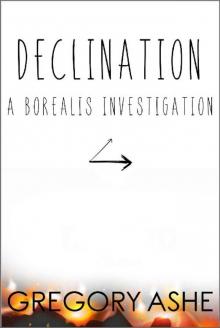 Declination
Declination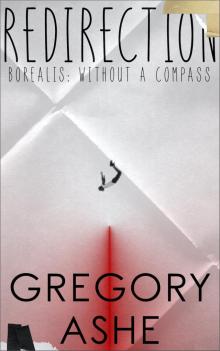 Redirection
Redirection Fold Thunder
Fold Thunder Hazard and Somerset
Hazard and Somerset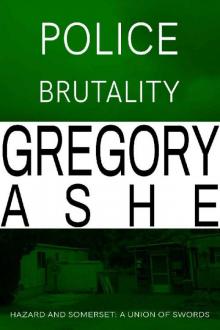 Police Brutality (Hazard and Somerset: A Union of Swords Book 2)
Police Brutality (Hazard and Somerset: A Union of Swords Book 2) Wayward
Wayward The Same End (The Lamb and the Lion Book 3)
The Same End (The Lamb and the Lion Book 3) The Dew of Flesh
The Dew of Flesh The Same End
The Same End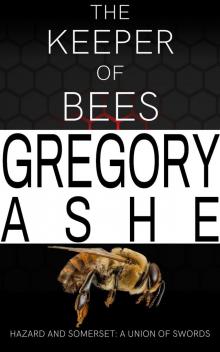 The Keeper of Bees ARC
The Keeper of Bees ARC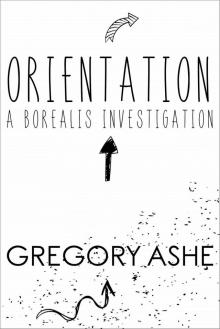 Orientation (Borealis Investigations Book 1)
Orientation (Borealis Investigations Book 1) The Indifferent Children of the Earth
The Indifferent Children of the Earth The Mortal Sleep (Hollow Folk Book 4)
The Mortal Sleep (Hollow Folk Book 4) The Rational Faculty (Hazard and Somerset: A Union of Swords Book 1)
The Rational Faculty (Hazard and Somerset: A Union of Swords Book 1) The Weeping Lore (Witte & Co. Investigations Book 1)
The Weeping Lore (Witte & Co. Investigations Book 1) Pretty Pretty Boys
Pretty Pretty Boys Transposition
Transposition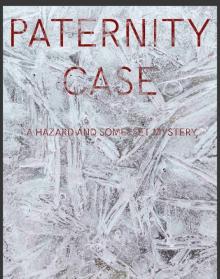 Paternity Case
Paternity Case